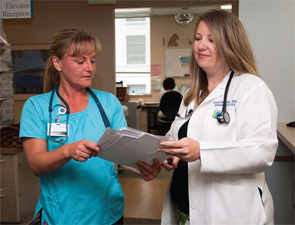Huisinga’s career as a rheumatology NP has coincided with the sea change in management of patients with rheumatic diseases. “In the 90s, when we had little to offer patients besides gold shots, prednisone, and methotrexate, they just came to see me for their maintenance labs. Now, the clinics have become much more of a place where people actually look to us for help and hope, because our goal is remission.” The dynamics of her patient population have also shifted. “We have a lot more young women coming out of the theater, and as a result, we have had expansion of numbers of lupus and RA patients.” As the field of rheumatology and treatments evolved, so have her roles as an NP specializing in rheumatology. That evolution, she says, has been key to the sustainability of her role. “I don’t think I would have stayed had not my role expanded,” she asserts.
Huisinga independently sees patients and, on some days, conducts clinic as the sole rheumatology provider working full-time in rheumatology, four days a week, 10 hours a day. As an NP with a family nurse-practitioner background, she draws on the full range of her capabilities to help her complex VA rheumatology patients. “I deal with their diabetes, congestive heart failure, and other mitigating factors when I’m prescribing rheumatology treatments. I am comfortable in my independent role because I know that I can page my boss at any time. He has been a great mentor. Usually, the cases I run by him are very complicated patients, such as those with mixed connective tissue disease, or complicated lupus or vasculitis.” She has also acquired a reputation as a procedural whiz: “I’ve taught many a resident and doctor how to do aspirations and injections,” she laughs.
Gordon Starkebaum, MD, chief of the rheumatology division at the VA Puget Sound, has worked with Huisinga for over 20 years. His advice to his rheumatology colleagues about incorporating a NP in the practice: “You have to choose a good person and expect that there will be some learning at the beginning.” Then, be prepared to broaden the scope of NP responsibilities, he says, “because anybody worth their salt would become bored with seeing only patients with osteoarthritis of the knee.” Rheumatologists and their NPs must also develop trust, he says, which is key to appropriate patient management, especially in a busy rheumatology service. (At the VA Puget Sound, they see 6,500 patients a year.) “Nurse practitioners have high expertise, but they are not physicians,” says Dr. Starkebaum. “As long as the NP understands that some problems are best handled by consulting with a partnering physician, then you have a very good situation.”

A Research Role
Rheumatology NPs also participate in research. Joyce P. Carlone, MN, RN, FNP-BC, CCRC, is an adjunct faculty member at Emory University’s Nell Hodgson School of Nursing in Atlanta, where she gives rheumatic disease lectures to NP and nurse midwife students. As a certified clinical research coordinator, she also currently manages five active studies. With her partnering rheumatologist, Doyt L. Conn, MD, she has been instrumental in organizing their institution’s participation in the Consortium for the Longitudinal Evaluation of African-Americans with Early Rheumatoid Arthritis (CLEAR) Registry, the largest study of African-Americans with RA.4

